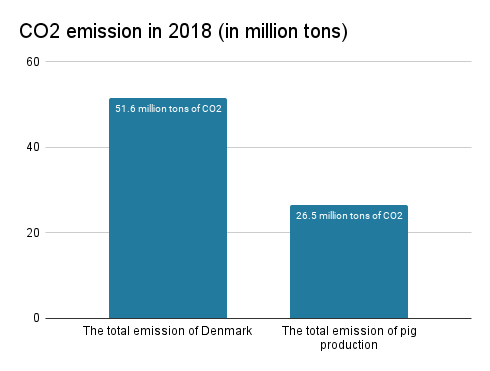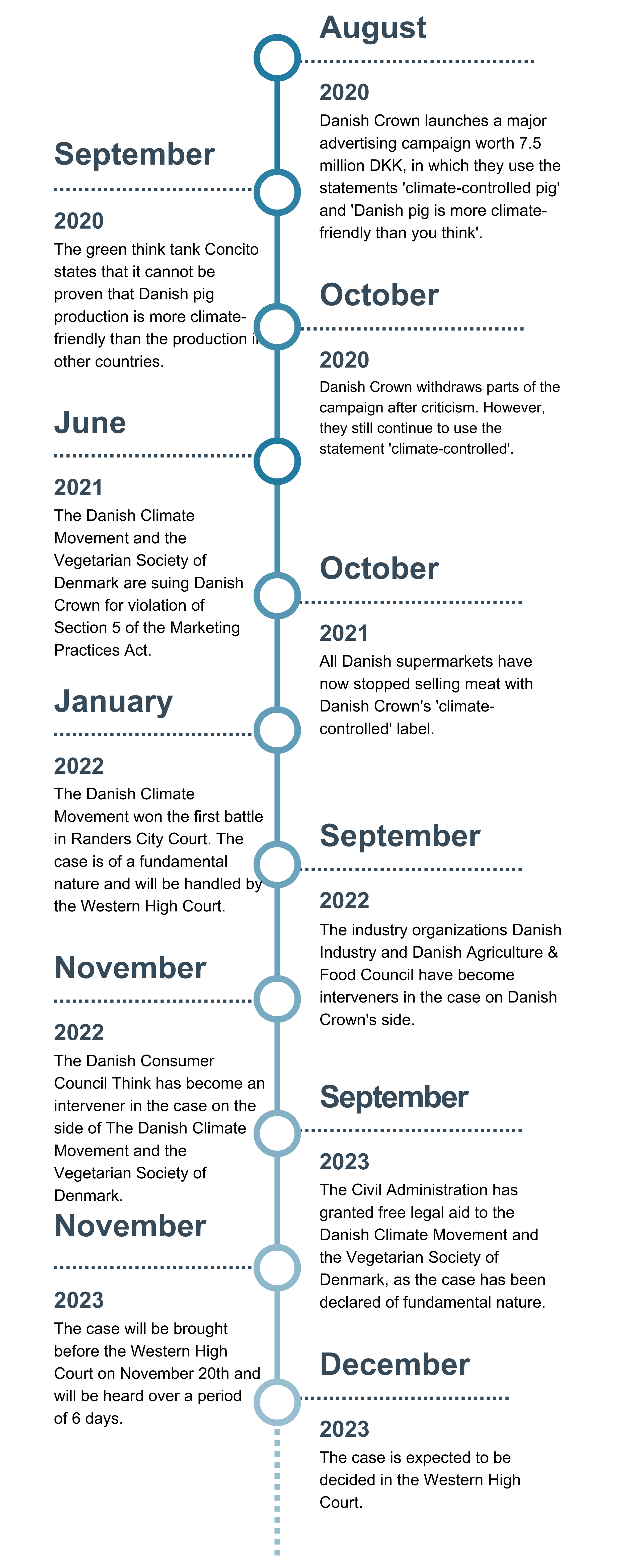
Putting a stop to greenwashing at the High Court
After two years, Danish Crown's climate pig campaign finally comes to an end. The Danish Climate Movement has joined forces with the Vegetarian Society of Denmark to sue Danish Crown for misleading consumers in their campaigns about "climate-controlled pigs" and that "Danish pigs are more environmentally friendly than we think.”
En dansk version af denne artikel findes her.
"I look forward to the case going to the High Court in November. I feel convinced that the High Court will rule in favour of The Danish Climate Movement and the Vegetarian Society of Denmark. There are still significant issues with greenwashing, so it is crucial that a line is drawn. Misleading claims about the climate impact of products make it very difficult for consumers to make informed climate choices, and that is not appropriate."
— Marc Malmbak Stounberg, Kontra Advokater
(translated from Danish)
-
Translate to English: Greenwashing is to 'wash' something greener than it actually is, in order for the company or organization to appear more environmentally friendly. This can be done by using climate-related terminology, climate labeling, or making a climate claim that is not supported by evidence.
Another important element is proportionality - the promotion should correspond to what is actually being done (i.e., one must not exaggerate the greenness of their product).
-
Greenwashing is a problem because it diverts attention from the issues at hand by creating economic benefits for the company, misleading consumers into believing that they are acting in a more environmentally friendly manner when the opposite is true. The company does not need to change its behavior, but rather only its marketing tactics, which ultimately leads to an increase in greenhouse gas emissions.
-
Section 5: A trader's commercial practice must not contain false information or in any other way, including overall presentation, deceive or be likely to deceive the average consumer, even if the information is factually correct.
Which means that a company must not lie or exaggerate their product(s) to be something they are not - in this context, more climate-friendly.
Danish Crown, one of Europe's largest pork producers, stands by its conviction that they did not engage in greenwashing in their 2020 campaign. These campaigns consisted of the claims "climate-controlled pig" and "Danish pigs are more climate-friendly than you think." In their defense, Danish Crown has stated that "consumers know that 'climate-controlled pig' means it comes from a farmer who wants to reduce the climate footprint" (Consumer Council Tænk). However, The Danish Climate Movement believes that this is not self-evident, and therefore, it is a clear violation of Section 5 of the Marketing Practices Act, which states that commercial practices must not contain false information or mislead the customer. That is why we, together with the Vegetarian Society of Denmark, sued Danish Crown in 2021, and on November 20th, we have an appointment with Danish Crown in the Western High Court based on the grounds that Danish Crown has acted in violation of our marketing practice act law with their climate statements.
We are lacking documentation
One of the main topics of the lawsuit against Danish Crown is the lack of documentation that their products are climate-friendly. We also believe that this lack of evidence is a violation of the Marketing Practices Act. Danish Crown has announced that there will be control of each individual pig producer, but only 3 years after the pig producer joins the project - Klimavejen. However, meat with the climate label from Klimavejen can already be sold from the day the producer joins the project. Additionally, it should be noted that the pig producer does not lose the right to the climate label even if they have not achieved the goals they agreed to.
The campaign faced resistance
Shortly after the campaign was launched, it faced resistance in the form of public criticism and was removed from supermarkets. In 2021, meat packages with Danish Crown's "climate-controlled" label were taken off the shelves. Thomas Roland, CSR Manager at Coop, commented to Børsen on the reasons behind removing products with Danish Crown's climate labels.
"We are pleased with improvements in the climate footprint of our suppliers, but we do not believe that the campaign is accurate towards consumers. Is the meat we receive from Danish Crown better than what we get from other suppliers? Danish Crown has not been able to provide documentation for that. And if there is no climate advantage, then it is not beneficial."
- Thomas Roland, Head of department, Responsibility at Coop
(translated from Danish)
Both the green think tank Concito, Consumer Council Tænk, and Greenpeace have also criticized Danish Crown's campaign for lacking documentation of Danish Crown's climate claims. Consumer Council Tænk subsequently applied to become interveners alongside The Danish Climate Movement and the Vegetarian Society of Denmark, which was approved last November, making them official supporters.
It is already challenging to make climate-friendly choices
A survey conducted by the consultancy firm Wilke for Danish Crown has shown that just over a third of Danes recognize the importance of sustainable shopping. However, only one in five Danes believes that it is easy to shop sustainably.
It is extremely difficult to determine which products are genuinely climate-friendly and which are not. This is not made any easier by the occurrence of greenwashing, where companies promote their products as much greener than they actually are.
Investigating all the products one purchases is a time-consuming process, and for most consumers, it is not a high priority to spend extra hours on shopping. Especially when you are standing in the supermarket with two hungry children in the middle of rush hour, having to scrutinize every item to see if what is written on the package is true. It becomes even more challenging when large companies conduct misleading campaigns.
Danish Crown was warned two years ago
In May 2021, The Danish Climate Movement made a letter in collaboration with the Vegetarian Society of Denmark to Danish Crown, stating that their claims of their pigs being climate-friendly are greenwashing.
The letter provided evidence as to why pork is not environmentally friendly. According to the World Resources Institute (WRI), one kilogram of pork has a carbon footprint of 4.6 kilograms of CO2, with an actual carbon footprint of 10.8 kilograms of CO2 per kilogram (including land use). In comparison to the plant-based alternatives that Danish Crown themselves have identified as an alternative to meat products, they have a carbon footprint of 0.2-1 kg of CO2 per kilogram of food. Based on WRI's calculation of CO2 per kilogram of pork, pork production in 2018 resulted in emissions of 26.5 million tons of CO2.
According to the United Nations' territorial emissions, Denmark had a total emission of 51.6 million tons of CO2 in the same year, 2018.
If we use the two different calculation methods, the pork production is responsible for a significant portion of CO2 emissions. In Denmark, we have a 2030 goal of a total annual CO2 emission of 22 million tons. Therefore, we believe that pork and Denmark's 2030 goals are not compatible. It is with this evidence, among other things, that we argue that pork cannot be climate-friendly and that Danish Crown has misled consumers into believing that their meat is climate-friendly.
The course of justice
Therefore, we utilize our legal system to draw a line in the sand. It must not be legal to deceive and profit from marketing stunts that turn out to be lies.
It will all come to a head on the 20th of November in the Western High Court, where the case will be decided and send a clear signal that greenwashing should not be an accepted stunt.
In The Danish Climate Movement, we strive for more transparency for the four out of five people who currently find it difficult to shop sustainably, as stated by Danish Crown. Greenwashing hinders the green transition by absolving responsibility and misleading consumers so that they believe they are acting in the interest of the climate. This is done to maintain trust in genuine climate initiatives that exist.


